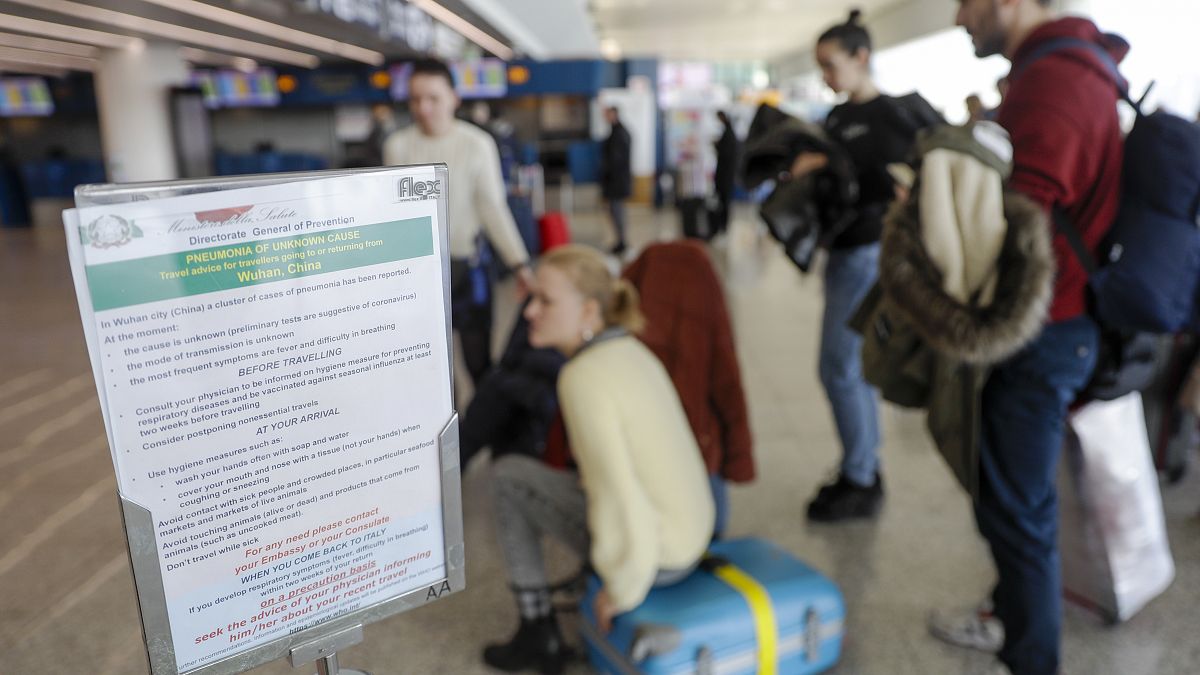Six people are now known to have died from the coronavirus. Health authorities worldwide are scrambling to come up with a response.
European health authorities should be ready to tackle the coronavirus should it reach the Old Continent, the head of a top health agency told Euronews on Tuesday, as the number of fatalities rose in China.
Nine people are now known to have died from the respiratory virus in China, authorities confirmed after announcing that the disease could be transmitted from human-to-human.
More than 400 people have been infected with cases also reported in Japan, South Korea, Thailand and the US.
The European Centre for Disease Prevention and Control (ECDC) on Wednesday considered the likelihood of introduction of the virus to the EU to be "moderate", warning also that the risk of arrival would increase in late January as people travelled to and from China to celebrate the Chinese New Year.
The Platform for European Preparedness Against (Re-)emerging Epidemics (PREPARE), an EU-funded project aimed at rapidly responding to outbreaks, activated its Mode 1 on Tuesday morning
“We consider that there’s a credible threat for a pandemic also in Europe,” Herman Goossens, PREPARE’s coordinator and the Director of Clinical Pathology at Antwerp’s University Hospital, told Euronews.
PREPARE’s Mode 1 involves getting clinical sites and diagnostics labs ready to deal with cases on European soil but also see researchers from various institutions discuss the research questions including the best treatment strategies for patients.
The outbreak currently concerning health officials worldwide is of a new strain of coronavirus (nCoV) which had not been previously identified in humans and for which there is no vaccine. Among the more serious viruses in the coronavirus family are the Middle East Respiratory Syndrome (MERS-CoV) and Severe Acute Respiratory Syndrome (SARS-CoV).
According to the World Health Organisation, which convened an emergency meeting on the outbreak to be held on Wednesday, common signs of infection include respiratory symptoms, fever, cough, shortness of breath and breathing difficulties with pneumonia, severe acute respiratory syndrome, and kidney failure among the most serious symptoms.
But contrary to previous pandemics, the international response has so far been “very fast”, Herman Goossens stressed.
“Now, fortunately, we know the sequence — the Chinese released that information 10 days ago — and a test has been validated by European researchers,” he said.
“The sequencing data was released very fast, the diagnostics test was developed very fast and we’re already discussing the clinical protocol. I’ve never seen this kind of response in previous epidemics or pandemics,” Goossens added.
"Is the EU equipped to deal with an outbreak? Yes, or not yet but it should be," before the end of January and beginning of February, when cases are more likely to be reported, he went on.
Supporting diagnostics labs will be critical, he continued, as the winter season may also bring a peak in influenza cases, which may lead worried people to rush to their doctors and demand to be tested for the virus.
The ECDC told Euronews in an email that entry screening is not considered to be an effective measure for detecting incoming travellers with infectious diseases but that "a targeted approach focussing on passengers from direct incoming flights may be considered".
London, Paris and Rome are the only three EU airports providing direct flights to Wuhan, the central Chinese city seen as the outbreak's epicentre.
Such entry screenings are to be conducted in Australia and the US. Japan and South Korea have also increased airport screenings.
In China, face masks are selling out fast while temperature checks are being conducted at airports.
To prevent the spread of coronavirus beyond Asia, WHO recommends that people travelling to China for the upcoming festivities avoid close contact with people suffering from acute respiratory infections as well as with live or dead farm or wild animals. It also advises frequent hand-washing.
Screening might be "futile"
But despite the rollout of screening technology, one Helskinki-based expert said it might not help prevent the spread of the virus.
"I'm very surprised that so many countries have gone through this. The WHO is very clear in their recommendations is that this is not very helpful. It's actually impossible to catch everyone in a connected society," said Mika Salminen, Director at the Department for Health Security at the Finnish Institute for Health and Welfare.
"This is more show than effect. It's probably futile," he said.
You can watch the full interview in the player above
